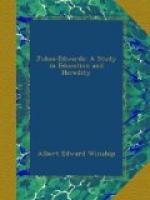Mr. Edwards was desirious of being married when he went to Northampton as associate pastor with his grandfather, Dr. Stoddard. Miss Pierrpont was only sixteen years of age, and she declined to be married until she was seventeen. He insisted, but she persisted in her refusal.
Mrs. Edwards lived in her children. To her husband came honor and glory in his lifetime, but to her came denial, toil and care. At eighteen, this young, beautiful, brilliant wife became a mother, and until she was forty, there was never a period of two years in which a child was not born to them, and no one of the eleven children died until after the last child was born. It was a home of little children. Her husband had no care for the household and she wished him to have none. It was her insistence that he should have thirteen hours of every twenty-four for his study. Whatever may have been the contribution of Mr. Edwards to the inheritance of the family, they owed the charming environment of the home to their mother.
This was a delightful home, as many persons have testified who knew it. I saw recently the diary of the famous George Whitefield, where he wrote that he sometimes wondered if it was not the Lord’s will that he should marry, that he might thereby be more useful, and that if it was the Lord’s will that he should marry, he wished to be reconciled thereto, but he did hope that the Lord would send him as a wife such a woman as Mrs. Edwards, whom he considered the most beautiful and noble wife for a Christian minister that he had ever known. If there be a more charming tribute to woman than this, I have not seen it.
In view of the character of her children and their great success in life, it may be interesting to know how she brought up the children, of whom there were so many, and for which the schools did so little. This is the testimony of one who knew of her home life well: “She had an excellent way of governing her children; she knew how to make them regard and obey her cheerfully. She seldom punished them, and in speaking to them used gentle and pleasant words. When she had occasion to reprove or rebuke, she would do it in a few words, without warmth and noise, and with all calmness and gentleness of mind. In her directions and reproofs of matters of importance, she would address herself to the reason of her children, that they might not only know her inclination and will, but at the same time be convinced of the reasonableness of it. She had need to speak but once and she was obeyed; murmuring and answering again were not known among them. In their manners they were uncommonly respectful to their parents. When their parents came into the room, they all rose instinctively from their seats and never resumed them until their parents were seated; and when either parent was speaking, no matter with whom they had been conversing, they were all immediately silent.
“Quarreling and contention were in her family wholly unknown. She carefully observed the first appearance of resentment and ill-will in her young children towards any person whatever, and did not connive at it, but was careful to show her displeasure, and suppress it to the utmost; yet not by angry, wrathful words.




